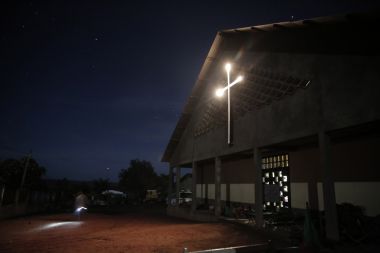Central African Republic pastor: 'Only God can save our country'

This week the United Nations took over the peacekeeping mission in Central African Republic from a regional African force. But in the face of ongoing conflict and a growing humanitarian crisis, one pastor feels his country is beyond the help of the UN.
Having spent the past three months travelling all over the country delivering food aid, the pastor (who cannot be named for security reasons) said he doesn't hold much hope for the work of the UN, as he issued a plea to the global Church.
At least 5,200 people have died since December, in a civil war stemming from a coup that overthrew the president in March 2013.
In a country with a population of about 4.6 million, about half are now in need of humanitarian aid, more than 300,000 people have fled to neighbouring countries, and about 500,000 are internally displaced. "The majority, unfortunately, are overlooked when it comes to aid, the Christians most of all," the pastor said.
The conflict in CAR is often described as sectarian violence between Christian militants known as the anti-balaka, and the Muslim Séléka, who were originally part of the coup against President François Bozizé. The Séléka rebels were themselves ousted from power in January 2014.
But both groups have only loose ties with their religious affiliations, and Muslim and Christian leaders from CAR have united to condemn the conflict. Significantly, CAR has no history of religious conflict.
"Politicians have been trying to draw the population into inter-religious conflicts, but when the manipulations cease, the people think again and seek dialogue. They need each other," the pastor added.
Many have resisted being drawn into religious confrontation, and there are regions where Muslims are sheltering in churches without being threatened. But there are areas controlled by the anti-balaka where Muslims are far from safe.
Unsurprisingly in a conflict that has been marked by gruesome brutality between two sides described as 'Christians' and 'Muslims', churches have seen a decline in attendance.
"There are certainly people still with deep wounds in their hearts, who cannot understand why God has allowed all these things to happen," the pastor said. "Church leaders are going to have to work hard to restore confidence and trust to many of the believers."
Despite both groups signing a ceasefire in July, the conflict continues, accompanied by deteriorating humanitarian conditions.
National life in CAR has virtually ground to a halt. "Police and military forces are powerless or non-existent. There is no justice. The schools are closed. Shops and businesses are no longer functioning, for lack of money," the pastor said.
"Farmers have nothing to harvest, for lack of seed. Certain towns in the interior are inaccessible due to the bad state of the roads, and the population there are cut off from the rest of the country," he added.
With food shortages across the country, market prices are soaring. In April the chief economist at the World Food Programme said: "I went to Bangui [the capital] to analyse how the overall economy is affected, particularly the food sector, and where we are in terms of the humanitarian response. I was shocked by what I saw and how deep the crisis extends. It really doesn't get much worse than this."
If things do not improve soon, widespread malnutrition will become yet another problem for this fragile nation to contend with. A representative from UNICEF in CAR has already warned that "more children will die from malnutrition than bullets".
Attempting to suppress the violence are 2,000 French troops, 5,000 African forces, and an additional 1,200 soldiers from Pakistan and Bangladesh that arrived in recent weeks.
While the French will continue to function independently, the remaining troops have now merged with the 1,800 UN peacekeepers, who officially took charge on Monday.
But the numbers sent by the UN fall short of the almost 7,000 additional troops that were approved in April, but the remaining forces are not likely to arrive before 2015.
There is obvious disappointment in the unfulfilled promises of foreign powers. "The international community, headed by France, says one thing, but when it comes to action, it's another matter," the pastor said.
"The presence of UN troops is not going to make much difference – [as in] the Democratic Republic of Congo. Only God can save our country. We ask for his children's prayers, and for coordinated intervention to give us a chance to come out from all this."











